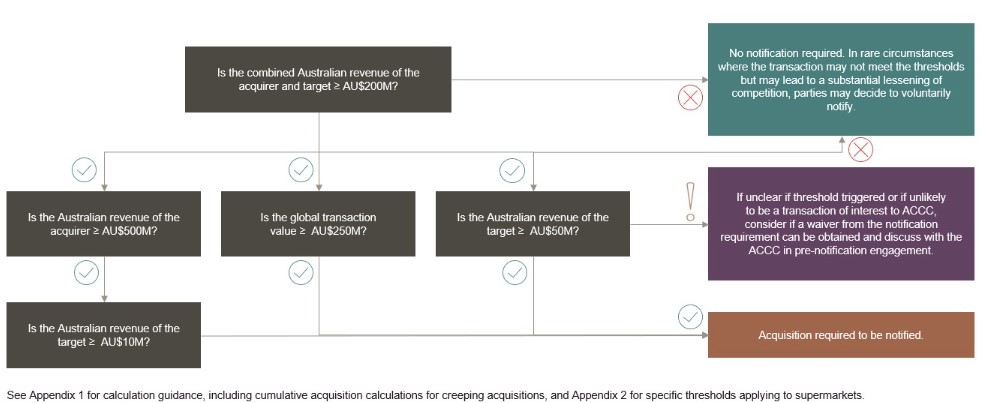
Insights


Australia | Publication | July 2025
|
Mergers or acquisitions that meet certain turnover thresholds will be required to be notified to the ACCC from 1 January, 2026. ACCC clearance is required before a deal can close. Please seek specific legal advice for your situation as the following is a simplified summary. |

Acquisitions of the following are within scope:
Acquisitions of the following are outside the scope:

Step 1: Pre-notification engagement with the ACCC.
Step 2: Parties complete and submit a long or short notification form. The long form is required where:
Step 3: The ACCC will confirm the effective notification date (after the filing fee is paid) and the review timeline will begin.
The filing fee to be paid to the ACCC with the notification is predetermined for each stage.
| Stage | Transaction value (if applicable) | Fee |
| Notification waiver | n/a | AU$8,300 |
| Phase 1 | n/a | AU$56,800 |
| Phase 2 - depending on transaction value | AU $50 million or less | AU$475,000 |
| More than AU $50 million but not more than AU $1 billion | AU$855,000 | |
| More than AU$1 billion | AU$1,595,000 | |
| Public benefits application | n/a | AU$401,000 |
Acquirers that are small businesses, i.e. have less than AU$10 million revenue in the previous financial year, are exempted from paying the fee.

| Phase | Timing |
|---|---|
|
Pre-notification discussions |
The ACCC will engage ‘promptly and meaningfully’ with businesses once a request is received. The ACCC recommends that parties initiate pre-notification engagement at least two weeks before formal notification and earlier for acquisitions which may raise competition concerns. |
|
Phase 1 |
There will be an initial ‘Phase 1’ review process of 30 business days, from a complete application being lodged. Most deals are expected to clear in this timeframe. There will also be scope for a fast-track determination by the ACCC after 15 business days if no competition issues arise. |
|
Phase 2 |
A ‘Phase 2’ review will be more in-depth and will take up to a further 90 business days. At the end of Phase 2, the merger can be put into effect with or without conditions or disallowed by the ACCC entirely. The ACCC cannot block a merger unless a |
|
Public benefit assessment (+50 further business days) |
From 2026, approval on the basis that there are substantial public benefits that outweigh anti-competitive downsides, is only able to be sought by merger parties if the ACCC blocks the deal in Phase 2. The prescribed period for this review is an |
|
Regime promotes timing discipline but the clock can be stopped |
If an ACCC determination is not made within the statutory timeframe for Phase 1 or Phase 2, the acquisition will be deemed approved. This is a significant shift from the current flexible timeframes for reviews in the informal regime that can be varied unilaterally by the ACCC. However, in practice we would expect the ACCC to utilise ‘stop the clock’ mechanisms to extend the statutory timelines thereby providing some flexibility. |
| Post-clearance waiting period | Deals cannot close for 14 calendar days after ACCC clearance occurs to allow any applications for review to be made. |

The approach to calculating revenue and transaction values is similar to that which applies in many jurisdictions.
1. Calculate the Australian revenue of all parties to the transaction
| Each principal entity acquiring control | The target |
|---|---|
|
Australian revenue of the previous financial year of each principal party to the acquisition and each of its connected entities ('acquirer group') In effect, this looks at the Australian Revenue of the entire corporate group involved in the transaction. |
|
2. Consider the transaction value
In measuring a transaction's value, the market values of all shares and assets being acquired and the consideration received or receivable for all of the shares and assets being acquired, must be considered.
3. Notes
While the preceding notification thresholds apply generally across the economy, certain transactions within the supermarket sector must be notified regardless of whether they meet the general notification thresholds and regardless of whether they result in a change in control.
Major supermarkets – Coles and Woolworths (including their connected entities) – must notify the ACCC of acquisitions of shares or assets where they are acquiring:
Specific land acquisitions for supermarket business are exempted from the notification obligation:

Publication
Afghanistan’s power sector is the cornerstone of the country’s economic development agenda, underpinning ambitions of industrialisation, economic growth and improved living standards. Despite the abundant resources - including hydropower, solar, wind and gas - Afghanistan continues to face energy access challenges.

Publication
As with earlier editions, the 6th European Edition of High Yield Bonds: An Issuer’s Guide is primarily intended for first-time issuers, to give business owners, chief financial officers, treasurers, in-house lawyers and other key stakeholders a better understanding of the high-yield product, and to help them evaluate the pros and cons of issuing high-yield notes.
Subscribe and stay up to date with the latest legal news, information and events . . .
© Norton Rose Fulbright LLP 2025